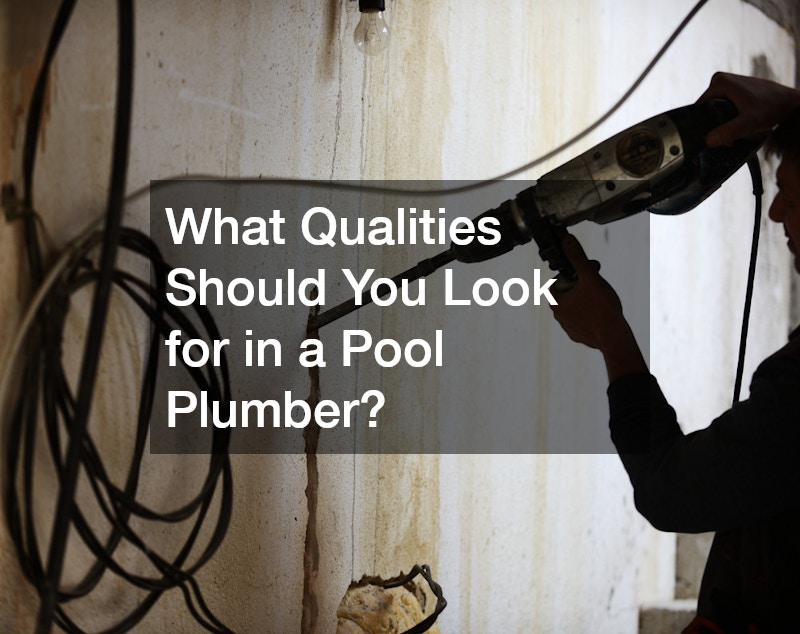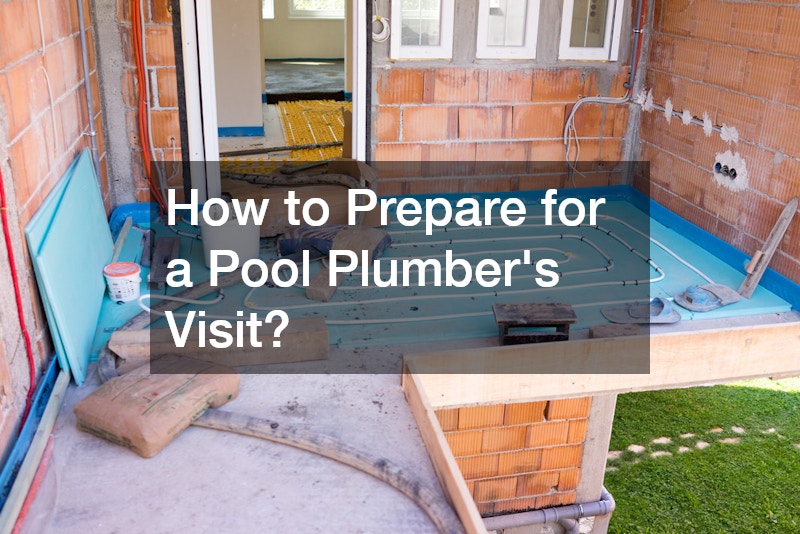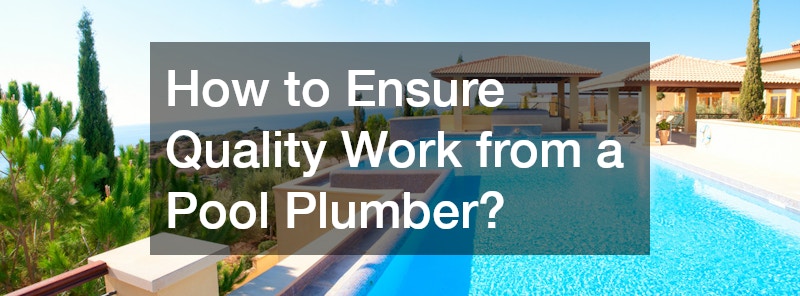

Engaging a pool plumber can be a daunting yet necessary task for homeowners and property managers striving to maintain a functional and luxurious swimming environment. Whether you are installing a new custom pool, addressing ongoing issues like leaks, or planning a full renovation involving pool replastering and pool deck resurfacing, having a reliable pool contractor on your side is essential. The expertise of a pool plumber goes far beyond general plumbing; they are specialists in diagnosing complex issues specific to aquatic systems, such as faulty pumps, poor water flow, and chlorine imbalances.
Moreover, their partnership with related service providers like a plumbing company or a water damage company ensures all facets of your pool system work seamlessly together. In this comprehensive guide, we will explore the vital considerations when working with pool plumbers. From verifying their credentials to understanding the scope of their services, and from scheduling regular maintenance to ensuring energy efficiency, this article is your go-to resource. Proper engagement with a qualified pool plumber not only saves you from costly repairs but also enhances the overall longevity and performance of your pool. By learning the right questions to ask and steps to take, you can enjoy a stress-free, crystal-clear swimming experience year-round.

1. What Qualities Should You Look for in a Pool Plumber?
When selecting a pool plumber, prioritising the right qualities is paramount to receiving high-quality, long-lasting service. First, experience and certification should top your checklist. A seasoned professional who has tackled various pool systems will be better equipped to handle complex jobs, including leak detection and plumbing line repairs. Certification indicates the plumber has met industry standards and possesses essential knowledge. Reputation and reviews are equally crucial; take the time to explore customer testimonials on trusted platforms, as they offer insights into the plumber’s reliability and workmanship. A specialised focus in pool plumbing is another strong advantage.
Unlike general plumbers, those with a background in pool systems understand the intricacies of pumps, filters, and water chemistry, providing more targeted solutions. Availability and response time can be deal-breakers, especially when you’re dealing with emergencies like leaks or pump failures. Opt for a professional who can offer prompt services, including easy replacement of damaged parts. Lastly, affordability matters, but it shouldn’t come at the expense of quality. Transparent pricing models that detail labour and material costs are essential, helping you avoid hidden fees. When combined, these qualities lay a strong foundation for a successful partnership with a pool plumber and contribute to the overall health of your swimming environment.
2. How to Verify a Pool Plumber’s Credentials?
Verifying a pool plumber’s credentials is a critical step to ensure you are working with a qualified and reliable professional. Begin by checking for proper licenses and certifications. These documents not only confirm the plumber’s legal eligibility to perform the work but also demonstrate their commitment to industry standards. Licensing boards can often verify this information online. Next, request references from past clients who have engaged the plumber for services like pool replastering or leak detection. Speaking directly to these customers provides real-world feedback on the plumber’s capabilities and reliability. Online reviews on sites such as Yelp or Google also offer valuable insights. Look for consistent patterns in reviews that highlight the plumber’s punctuality, professionalism, and quality of work. Insurance coverage is another non-negotiable credential.
A properly insured pool contractor protects you from liability in case of accidents or damage during the project. Finally, consider consulting with professional associations, such as those related to pool builders or plumbing companies. Membership in these organisations is often a mark of credibility and ongoing professional development. Verifying these credentials upfront may take time, but it pays off in the long run by ensuring you receive high-calibre, risk-free service tailored to your custom pool needs.
3. What Pool Problems Can a Plumber Resolve?
A pool plumber is trained to handle a wide array of issues that can impact the functionality and enjoyment of your swimming pool. One of their most crucial roles involves leak detection and repair. Unaddressed leaks not only waste water but can also lead to structural problems requiring intervention from a water damage company. In addition, pool plumbers are well-versed in diagnosing and fixing pump and filter issues. These components are vital for maintaining water clarity and cleanliness, and any malfunction can lead to cloudy or unsanitary water. Heater malfunctions are another common problem that pool plumbers can resolve, ensuring your pool remains usable even during cooler months. When it comes to plumbing line installation and repair, these specialists ensure that water flows correctly throughout the pool system, preventing pressure loss and inefficiency.
Moreover, they can assist with water chemistry balancing by ensuring that chemical feeders and water conditioners are functioning properly. Poor chemical balance can not only damage pool surfaces but also irritate swimmers. Whether you’re managing a brand-new custom pool or an ageing installation needing pool replastering, a qualified pool plumber plays a critical role in ensuring all elements work harmoniously, offering you peace of mind and a flawless swimming experience.

4. How to Prepare for a Pool Plumber’s Visit?
Preparing adequately for a pool plumber’s visit can significantly streamline the service process and ensure a more efficient outcome. First, take time to understand the problem you are facing. Document symptoms such as reduced water flow, visible leaks, or unusual noises from the equipment. This information helps the pool contractor diagnose the issue quickly. Gather any relevant documentation, including warranties, previous service records, and pool specifications. These materials provide essential context that could influence the repair approach or highlight ongoing issues like the need for pool deck resurfacing. Ensuring the pool area is accessible is another key step. Clear away furniture, pool covers, or any obstructions that might hinder the plumber’s ability to work. Communication is also vital; clearly convey your expectations regarding timelines, budget, and desired outcomes.
If the visit involves major tasks such as pool replastering or plumbing line replacement, confirm the scope in writing. Lastly, schedule the visit during optimal times, ideally when weather conditions are stable and pool usage is minimal. This proactive approach not only facilitates smoother operations but also builds a better working relationship with the plumber. By taking these steps, you lay the groundwork for successful repairs or upgrades, whether you’re working with a solo plumbing company or a full-service pool builder team.
5. What Are the Common Costs Associated with Pool Plumbing?
Understanding the typical costs associated with pool plumbing services can help you budget more effectively and avoid unexpected financial surprises. The first expense you may encounter is the initial consultation fee. This charge typically covers the plumber’s assessment of your pool system and is often credited toward the final bill if you proceed with the service. Labour costs form a significant portion of the total expense and vary depending on the complexity of the job. For instance, minor leak detection might be relatively inexpensive, while replacing a damaged line or installing a new pump can require more time and higher labour charges. Parts and materials are another crucial factor.
High-quality components, such as water conditioners, energy-efficient pumps, or pool replastering materials, might carry a higher price tag but offer long-term savings. Emergency service charges can also drive up costs, especially if issues arise during off-hours or holidays. However, investing in routine maintenance or upgrading outdated systems can prevent emergency repairs and save money over time. Partnering with an experienced pool contractor or plumbing company that offers transparent pricing ensures that you understand all potential expenses upfront, enabling you to make informed decisions about your pool’s upkeep.
6. How Often Should You Schedule Maintenance with a Pool Plumber?
Regular maintenance with a pool plumber is key to keeping your swimming pool in optimal condition throughout the year. The frequency of these check-ups often depends on seasonal changes. Most pool builders recommend a comprehensive inspection at least twice a year, ideally in spring before heavy usage and in autumn for winterisation. If your pool experiences high usage, such as in commercial or multifamily settings, more frequent maintenance may be necessary. Certain signs indicate the immediate need for a pool plumber, such as sudden drops in water level, noisy equipment, or cloudy water. Preventative maintenance is especially valuable, as it helps avoid costly repairs by catching small issues early, such as minor leaks that could otherwise require intervention from a water damage company.
Some homeowners opt for tailored maintenance plans offered by their preferred plumbing company or pool contractor. These plans can include services like pool deck resurfacing, equipment calibration, water chemistry testing, and water conditioner inspections. A well-maintained pool not only ensures safety and cleanliness but also extends the lifespan of major components, reducing long-term costs. Scheduling regular visits from a qualified pool plumber gives you peace of mind and ensures that your investment remains a source of enjoyment, not stress.

7. Can a Pool Plumber Help with Energy Efficiency?
Absolutely, a skilled pool plumber can significantly enhance your swimming pool’s energy efficiency. One of the most impactful upgrades involves installing energy-efficient equipment, such as variable-speed pumps and advanced filtration systems. These devices consume less electricity while maintaining optimal water quality. Optimising the existing pump and filter setup is another strategy. A pool contractor can recalibrate your system to run during off-peak hours or suggest resizing components to suit your pool’s specific needs. Solar heating installations are also within a pool plumber’s skill set. These systems harness renewable energy, drastically reducing heating costs. Additionally, expert advice on pool covers and insulation can help retain heat and minimise evaporation, both of which lower energy consumption.
Some pool plumbers even perform cost-benefit analyses to help homeowners understand the long-term savings of these upgrades. Whether you’re enhancing a custom pool or performing renovations that include pool replastering, integrating energy-efficient solutions not only benefits the environment but also lowers utility bills. Collaborating with experienced pool builders or a reputable plumbing company ensures that all upgrades are compatible with your current system and deliver maximum return on investment.
8. How to Troubleshoot Basic Pool Plumbing Problems Yourself?
While some issues require a professional pool plumber, there are several basic troubleshooting steps that pool owners can undertake themselves. Start by identifying common symptoms, such as air bubbles in the return jets, decreased suction, or unexpected water level drops. These could point to minor problems like clogged skimmer baskets, air leaks in suction lines, or failing check valves. Basic plumbing repairs, such as replacing o-rings or cleaning out filter cartridges, can often be done with minimal tools and DIY guides. Numerous resources, including manufacturer manuals and online videos from trusted pool builders or plumbing companies, offer step-by-step instructions. However, it’s crucial to recognise when professional help is needed.
For instance, if leak detection efforts are inconclusive or the issue appears to involve underground piping, calling a licensed pool contractor is advisable. Always take safety precautions when handling electrical components or chemical feeders, and wear appropriate protective gear. Keeping a water conditioner on hand can also help maintain proper chemical balance during minor maintenance tasks. By handling basic troubleshooting and knowing your limits, you can save on service calls and maintain your pool in better condition between professional visits.
9. What Questions Should You Ask a Pool Plumber?
Asking the right questions when engaging a pool plumber can greatly influence the success of your project. Start by clarifying the scope of work. Whether it involves pool deck resurfacing, plumbing upgrades, or leak detection, ensure both parties have a mutual understanding of the tasks involved. Inquire about estimated timeframes for project completion, especially if you’re on a tight schedule or coordinating with other contractors like a water damage company. Understanding the warranty and guarantee terms is another key area. This includes parts, labour, and how long the workmanship is covered. It’s also beneficial to discuss future maintenance plans, particularly for more complex installations like a custom pool. Some plumbing companies offer bundled service packages that can reduce costs over time.
Lastly, align on budget and payment terms. Ask whether the estimate is fixed or subject to change, what the payment milestones are, and if financing options are available. These questions not only help in selecting the most competent pool plumber but also prevent miscommunication down the line. Establishing this clear dialogue ensures that your pool project is completed efficiently and to your satisfaction.

10. How to Ensure Quality Work from a Pool Plumber?
Ensuring quality workmanship from your pool plumber involves a combination of proactive engagement and post-service evaluation. One of the best ways to maintain oversight is by regularly monitoring the progress of the work. Frequent check-ins allow you to address issues early and ensure that the job is adhering to agreed-upon specifications. Requesting detailed invoices also helps track expenses and ensures transparency, particularly for large-scale tasks such as pool replastering or plumbing overhauls. If the plumber’s assessment or quote seems off, don’t hesitate to seek second opinions, especially from other reputable pool builders or a plumbing company you trust. Providing constructive feedback is another valuable step. Leaving honest reviews benefits the service provider and informs other homeowners.
Lastly, consider scheduling follow-up visits to verify that the work holds up over time. This is particularly important for installations involving water conditioners or pump systems that require periodic calibration. By staying engaged throughout the process and maintaining open communication, you significantly increase the likelihood of receiving top-tier service. The goal is not just a quick fix, but a long-term solution that enhances the functionality, safety, and beauty of your swimming pool.
Ensure Long-Term Pool Health by Partnering with the Right Pool Plumber
Navigating the complexities of hiring and working with a pool plumber doesn’t have to be overwhelming. Armed with the right knowledge and approach, you can make informed choices that ensure your swimming pool remains in top-notch condition year-round. From evaluating credentials to understanding common plumbing issues, and from asking the right questions to ensuring energy-efficient upgrades, this guide offers a complete framework for pool maintenance success. Whether you’re considering a custom pool installation, need pool deck resurfacing, or are simply looking for easy replacement of worn-out components, collaborating with a qualified pool contractor or plumbing company pays off in the long run.
Moreover, professionals who specialise in leak detection, water conditioning, and even partnerships with a water damage company can help you protect your investment from future complications. Remember, consistent maintenance and open communication are key to avoiding costly repairs and enjoying a clean, functional, and aesthetically pleasing pool. With these essential tips, you’ll be well-prepared to engage a pool plumber confidently, ensuring that every aspect of your aquatic retreat is expertly managed for safety, efficiency, and long-term satisfaction.